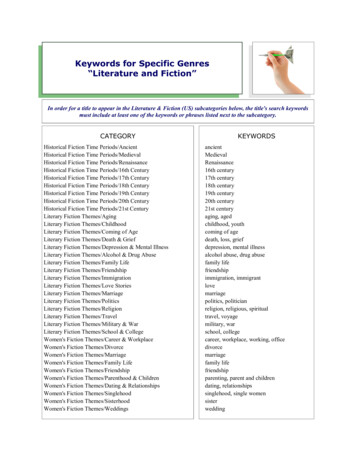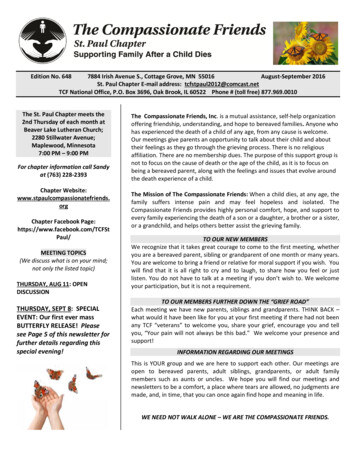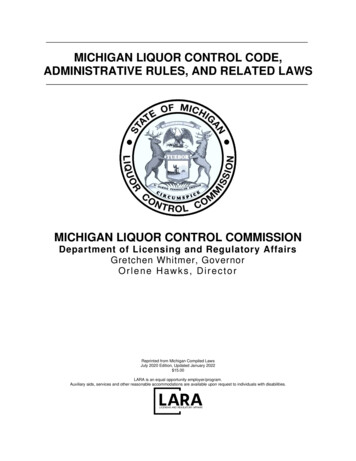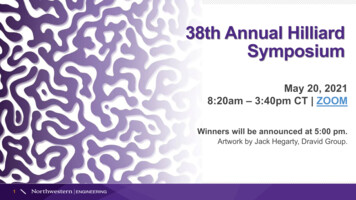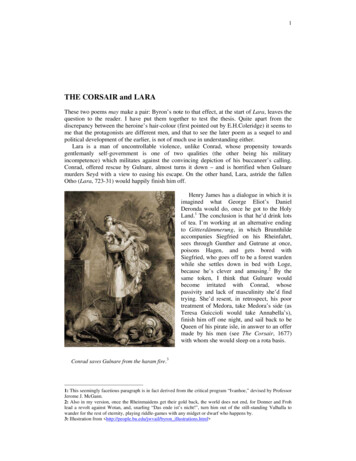
Transcription
1THE CORSAIR and LARAThese two poems may make a pair: Byron’s note to that effect, at the start of Lara, leaves thequestion to the reader. I have put them together to test the thesis. Quite apart from thediscrepancy between the heroine’s hair-colour (first pointed out by E.H.Coleridge) it seems tome that the protagonists are different men, and that to see the later poem as a sequel to andpolitical development of the earlier, is not of much use in understanding either.Lara is a man of uncontrollable violence, unlike Conrad, whose propensity towardsgentlemanly self-government is one of two qualities (the other being his militaryincompetence) which militates against the convincing depiction of his buccaneer’s calling.Conrad, offered rescue by Gulnare, almost turns it down – and is horrified when Gulnaremurders Seyd with a view to easing his escape. On the other hand, Lara, astride the fallenOtho (Lara, 723-31) would happily finish him off.Henry James has a dialogue in which it isimagined what George Eliot’s DanielDeronda would do, once he got to the HolyLand.1 The conclusion is that he’d drink lotsof tea. I’m working at an alternative endingto Götterdämmerung, in which Brunnhildeaccompanies Siegfried on his Rheinfahrt,sees through Gunther and Gutrune at once,poisons Hagen, and gets bored withSiegfried, who goes off to be a forest wardenwhile she settles down in bed with Loge,because he’s clever and amusing.2 By thesame token, I think that Gulnare wouldbecome irritated with Conrad, whosepassivity and lack of masculinity she’d findtrying. She’d resent, in retrospect, his poortreatment of Medora, take Medora’s side (asTeresa Guiccioli would take Annabella’s),finish him off one night, and sail back to beQueen of his pirate isle, in answer to an offermade by his men (see The Corsair, 1677)with whom she would sleep on a rota basis.Conrad saves Gulnare from the haram fire.31: This seemingly facetious paragraph is in fact derived from the critical program “Ivanhoe,” devised by ProfessorJerome J. McGann.2: Also in my version, once the Rheinmaidens get their gold back, the world does not end, for Donner and Frohlead a revolt against Wotan, and, snarling “Das ende ist’s nicht!”, turn him out of the still-standing Valhalla towander for the rest of eternity, playing riddle-games with any midget or dwarf who happens by.3: Illustration from http://people.bu.edu/jwvail/byron illustrations.html
2She would not, I think, returning with himto his native Spain, dress as a page to satisfyhis quasi-pederastic whim, dye her naturallyauburn hair raven-black, and follow himaround mutely, conversing – when he felt likeit – in a Levantine language which only theyunderstood.If the protagonist’s personality makesThe Corsair hard to deal with, the narrativeof Lara makes re-reading that poem anannoyance. The eruption of Esselin into thebanquet is never explained (we’d like toknow the secret he has about Lara’s earlieryears) – Otho’s self-substitution at theplanned duel is unconvincing – the “serf”revolt is dragged in without preparation, tokeep things going – and the presumedassassination of Esselin is tagged on, with ahuge and irrelevant prose-note to paper overthe crack. The questions asked are nottantalising, just annoying examples ofByron’s indifference. In a letter of January1815 to Thomas Moore he wrote,Kaled4I have tired the rascals (i.e. the public) with my Harrys and Larrys, Pilgrims and Pirates. Nobodybut S outhe y has done any thing worth a slice of bookseller’s pudding; and he has not luckenough to be found out in doing a good thing. Now, Tom, is thy time .5The note of fatigue and literary self-disgust seems genuine – you would not know that TheCorsair had sold 10,000 copies on the first day of its sale. However, despite what Byron saysin the first sentence of his dedication, the two best of the “Turkish Tales” – The Siege ofCorinth and Parisina – were still to come.4: Illustration from http://people.bu.edu/jwvail/byron illustrations.html .5: BLJ IV 252-3.
3The Corsair;A TALE“– I suoi pensieri in lui dormir non ponno.”TASSO, Canto decimo, Gerusalemme Liberata.TOTHOMAS MOORE, ESQ.MY DEAR MOORE,I dedicate to you the last production with which I shall trespass on public patience, and yourindulgence, for some years; and I own that I feel anxious to avail myself of this latest andonly opportunity of adorning my pages with a name, consecrated by unshaken publicprinciple, and the most undoubted and various talents. While Ireland ranks you amongst theforemost of her patriots – while you stand alone the first of her bards in her estimation, andBritain repeats and ratifies the decree – permit one, whose only regret, since our firstacquaintance, has been the years he had lost before it commenced, to add the humble, butsincere suffrage of friendship, to the voice of more than one nation. It will at least prove toyou, that I have neither forgotten the gratification derived from your society, nor abandonedthe prospect of its renewal, whenever your leisure or inclination allows you to atone to yourfriends for too long an absence. It is said among those friends, I trust truly, that you areengaged in the composition of a poem6 whose scene will be laid in the East; none can dothose scenes such justice. The wrongs of your own country, the magnificent and fiery spirit ofher sons, the beauty and feeling of her daughters, may there be found; and Collins, when hedenominated his Oriental, his Irish Eclogues, was not aware how true, at least, was a part ofhis parallel. Your imagination will create a warmer sun, and less clouded sky; but wildness,tenderness, and originality are part of your national claim of oriental descent,7 to which youhave already thus far proved your title more clearly than the most zealous of your country’santiquarians. May I add a few words on a subject on which all men are supposed to be fluent,and none agreeable? – Self. I have written much, and published more than enough to demanda longer silence than I now meditate; but for some years to come it is my intention to tempt nofurther the award of “Gods, men, nor columns.”8 In the present composition I have attemptednot the most difficult, but, perhaps, the best adapted measure to our language, the good oldand now neglected heroic couplet: – the stanza of Spenser9 is perhaps too slow and dignifiedfor narrative; though, I confess, it is the measure most after my own heart; and Scott alone, ofthe present generation, has hitherto completely triumphed over the fatal facility of the of theocto-syllabic verse; and this is not the least victory of his fertile and mighty genius. In blankverse, Milton, Thomson, and our dramatists, are the beacons that shine along the deep, butwarn us from the rough and barren rock on which they are kindled. The heroic couplet is notthe most popular measure certainly; but as I do not deviate into the other from a wish to flatterwhat is called public opinion, I shall quit it without further apology, and take my chance oncemore with that versification, in which I have hitherto published nothing but compositionswhose former circulation is part of my present and will be of my future regret.106: Lalla Rookh. Its publication was to motivate B.’s realisation of his distaste for the Romantic movement.7: Two philologists, Major (later General) Charles Vallancey (1721-1812) and Sir Laurence Parsons (later Earl ofRosse: 1758-1841) were both Irish patriots. Parsons, M.P. for Dublin University, opposed the Union with Englandin 1801. Their researches led them to the conclusion that the Irish had, via their contact with Carthage, a moredistinguished pedigree than the English. Parsons floated the idea that the Carthaginians were descended from theIrish: Vallancey asserted a resemblance between Irish and Kalmuck, Algonquin, Egyptian, Persian, andHindustani. See Don Juan, VIII, stanza 23.8: Horace, Ars Poetica, 372-3; quoted at HfH 588, or TVOJ 91, 8.9: B. had written Childe Harold I and II in Spenserian stanzas.10: B. refers to EBSR.
4With regard to my story, and stories in general, I should have been glad to have renderedmy personages more perfect and amiable, if possible, inasmuch as I have been sometimescriticised, and considered no less responsible for their deeds and qualities than if all had beenpersonal. Be it so – if I have deviated into the gloomy vanity of “drawing from self,” thepictures are probably like, since they are unfavourable; and if not, those who know me areundeceived, and those who do not, I have little interest in undeceiving. I have no particulardesire that any but my acquaintance should think the author better than the beings of hisimagining; but I cannot help a little surprise, and perhaps amusement, at some odd criticalexceptions in the present instance, when I see several bards (far more deserving, I allow) invery reputable plight, and quite exempted from all participation in the faults of those heroes,who, nevertheless, might be found with little more morality than “The Giaour,” and perhaps –but no – I must admit Chile Harold to be a very repulsive personage; and as to his identity,those who like it must give him whatever “alias” they please.If, however, it were worth while to remove the impression, it might be of some service tome, that the man who is alike the delight of his readers and his friends – the poet of all circles– and the idol of his own, permits me here and elsewhere to subscribe myself,most truly,and affectionately,his obedient servant,BYRONJanuary 2, 1814.
5The CorsairCANTO THE FIRST“ – – – – – – – – – – – – nessun maggior dolore,Che ricordarsi del tempo feliceNelle miseria, – – – – – – – – – – – –” DANTE.11The time in this poem may seem too short for the occurrences, but the whole of the Ægeanisles are within a few hours sail of the continent, and the reader must be kind enough to takethe wind as I have often found it.121.“O’ER the glad waters of the dark blue sea,Our thoughts as boundless, and our souls as free,13Far as the breeze can bear, the billows foam,Survey our empire, and behold our home!These are our realms, no limits to their sway –Our flag the sceptre all who meet obey.Ours the wild life in tumult still to rangeFrom toil to rest, and joy in every change.Oh, who can tell? not thou, luxurious slave!Whose soul would sicken o’er the heaving wave;Not thou, vain lord of wantonness and ease!Whom slumber soothes not – pleasure cannot please –Oh, who can tell, save he whose heart hath tried,And danced in triumph o’er the waters wide,The exulting sense – the pulse’s maddening play,That thrills the wanderer of that trackless way?That for itself can woo the approaching fight,And turn what some deem danger to delight;That seeks what cravens shun with more than zeal,And where the feebler faint – can only feel –Feel – to the rising bosom’s inmost core,Its hope awaken and its spirit soar?No dread of death – if with us die our foes –Save that it seems even duller than repose;Come when it will – we snatch the life of life –When lost – what recks it – by disease or strife?Let him who crawls enamoured of decay,Cling to his couch, and sicken years away:Heave his thick breath, and shake his palsied head;Ours – the fresh turf; and not the feverish bed.While gasp by gasp he faulters forth his soul,Ours with one pang – one bound – escapes controul.His corse may boast its urn and narrow cave,And they who loathed his life may gild his grave –Ours are the tears, though few, sincerely shed,510152025303511: Inferno, V, 122-4; translated by B.: “The greatest of all woes / Is to recall to mind our happy days / In misery ” (Francesca of Rimini, 25-7). Francesca speaks to Dante in the Circle of the Lustful. It is hard to see therelevance of her words, in any of the three epigraphs, to the action of The Corsair.12: In his eastern travels, B. skirted the Aegean twice.13: B. opens with a hymn to the joy of the pirate’s life, reminiscent of the long speech of Selim at BoA, 633-972.
6When Ocean shrouds and sepulchres our dead.For us, even banquets fond regret supplyIn the red cup that crowns our memory;And the brief epitaph in danger’s day,When those who win at length divide the prey,And cry, Remembrance saddening o’er each brow,How had the brave who fell exulted now!”402.Such were the notes that from the Pirate’s isleAround the kindling watch-fire rang the while:Such were the sounds that thrilled the rocks along,And unto ears as rugged seemed a song!In scattered groupes upon the golden sand,They game – carouse – converse – or whet the brand;Select the arms – to each his blade assign,And careless eye the blood that dims its shine.Repair the boat, replace the helm or oar,While others straggling muse along the shore:For the wild bird the busy springes set,Or spread beneath the sun the dripping net:Gaze where some distant sail a speck suppliesWith all the thirsting eve of Enterprize:Tell o’er the tales of many a night of toil,And marvel where they next shall seize a spoil;No matter where – their chief’s allotment this;Theirs, to believe no prey nor plan amiss.But who that CHIEF? his name on every shoreIs famed and feared – they ask and know no more.With these he mingles not but to command –Few are his words, but keen his eye and hand.Ne’er seasons he with mirth their jovial mess,But they forgive his silence for success.Ne’er for his lip the purpling cup they fill,That goblet passes him untasted still –And for his fare – the rudest of his crewWould that, in turn, have passed untasted too;Earth’s coarsest bread, the garden’s homeliest roots,And scarce the summer luxury of fruits,His short repast in humbleness supplyWith all a hermit’s board would scarce deny.But while he shuns the grosser joys of sense,His mind seems nourished by that abstinence.“Steer to that shore!” – they sail. “Do this!” – ’tis done –“Now form and follow me!”14 – the spoil is won.Thus prompt his accents and his actions still,And all obey and few enquire his will;To such, brief answer and contemptuous eyeConvey reproof, nor further deign reply.45505560657075803.14: Compare the Centurion at Matthew 8, 9: For I am a man under authority, having soldiers under me: and I sayto this man, Go, and he goeth; and to another, Come, and he cometh; and to my servant, Do this, and he doeth it.
7“A sail! – sail!” – a promised prize to Hope!Her nation – flag – how speaks the telescope?No prize, alas! but yet a welcome sail;The blood-red signal glitters in the gale.Yes – she is ours – a home-returning bark –Blow fair, thou breeze! – she anchors ere the dark.Already doubled is the cape – our bayReceives that prow which proudly spurns the spray.How gloriously her gallant course she goes!Her white wings flying – never from her foes –She walks the waters like a thing of life,And seems to dare the elements to strife –Who would not brave the battle – fire – the wreck –To move the monarch of her peopled deck?8590954.Hoarse o’er her side the rustling cable rings;The sails are furled; and anchoring round she swings;And gathering loiterers on the land discernHer boat descending from the latticed stern.’Tis manned – the oars keep concert to the strand,Till grates her keel upon the shallow sand.Hail to the welcome shout! – the friendly speech!When hand grasps hand uniting on the beach;The smile, the question, and the quick reply,And the heart’s promise of festivity!1001055.The tidings spread, and gathering grows the crowd;The hum of voices, and the laughter loud,And woman’s gentler anxious tone is heard –Friends’, husbands’, lovers’ names in each dear word;“Oh! are they safe? we ask not of success –But shall we see them? will their accents bless?From where the battle roars, the billows chafe,They doubtless boldly did – but who are safe?Here let them haste to gladden and surprize,And kiss the doubt from these delighted eyes!”1101156.“Where is our chief? for him we bear report –And doubt that joy – which hails our coming – short,Yet thus sincere, ’tis cheering, though so brief;But, Juan! instant guide us to our chief –Our greeting paid, we’ll feast on our return,And all shall hear what each may wish to learn.”Ascending slowly by the rock-hewn way,To where his watch-tower beetles o’er the bay,By bushy brake, and wild flowers blossoming,And freshness breathing from each silver spring,120125
8Whose scattered streams from granite basins burst,Leap into life, and, sparkling, woo your thirst;From crag to cliff they mount – Near yonder cave,What lonely straggler looks along the wave?In pensive posture leaning on the brand,Not oft a resting-staff to that red hand?“Tis he – ’tis Conrad – here, as wont, alone;On – Juan! on – and make our purpose known.The bark he views – and tell him we would greetHis ear with tidings he must quickly meet;We dare not yet approach – thou know’st his moodWhen strange or uninvited steps intrude.”1301357.Him Juan sought, and told of their intent –He spake not, but a sign expressed assent.140These Juan calls – they come – to their saluteHe bends him slightly, but his lips are mute.“These letters, Chief, are from the Greek – the spy,Who still proclaims our spoil or peril nigh;Whate’er his tidings, we can well report,145Much that –” – “Peace, peace!” – he cuts their prating short.Wondering they turn, abashed, while each to eachConjecture whispers in his muttering speech;They watch his glance with many a stealing look,To gather how that eye the tidings took;150But, this as if he guessed, with head aside,Perchance from some emotion – doubt, or pride,He read the scroll – “My tablets, Juan – hark –Where is Gonsalvo?”15In the anchored bark.”“There let him stay – to him this order bear.155Back to your duty – for my course prepare:Myself this enterprize to-night will share.”“To-night, Lord Conrad!”“Ay! at set of sun;The breeze will freshen when the day is done.My corslet – cloak – one hour and we are gone.160Sling on thy bugle – see that free from rustMy carbine-lock springs worthy of my trust.Be the edge sharpened of my boarding-brand,And give its guard more room to fit my hand.This let the Armourer with speed dispose;165Last time, it more fatigued my arm than foes;Mark that the signal-gun be duly fired,To tell us when the hour of stay’s expired.”15: It is not clear why Conrad asks for Gonsalvo. See below, 578 n.
98.They make obeisance, and retire in haste,Too soon to seek again the watery waste;Yet they repine not – so that Conrad guides;And who dare question aught that he decides?That man of loneliness and mystery,Scarce seen to smile, and seldom heard to sigh –Whose name appals the fiercest of his crew,And tints each swarthy cheek with sallower hue;Still sways their souls with that commanding artThat dazzles, leads, yet chills the vulgar heart.What is that spell, that thus his lawless trainConfess and envy – yet oppose in vain?What should it be, that thus their faith can bind?The power of Thought – the magic of the Mind!Linked with success, assumed and kept with skill,That moulds another’s weakness to its will;Wields with their hands, but, still to these unknown,Makes even their mightiest deeds appear his own.Such hath it been shall be – beneath the sunThe many still must labour for the one!’Tis Nature’s doom – but let the wretch who toilsAccuse not – hate not – him who wears the spoils.Oh! if he knew the weight of splendid chains,How light the balance of his humbler pains!1701751801851909.Unlike the heroes of each ancient race,Demons in act, but Gods at least in face,In Conrad’s form seems little to admire,Though his dark eyebrow shades a glance of fire;Robust but not Herculean – to the sightNo giant frame sets forth his common height;16Yet, in the whole, who paused to look again,Saw more than marks the crowd of vulgar men;They gaze and marvel how – and still confessThat thus it is, but why they cannot guess.Sun-bumt his cheek, his forehead high and pale –The sable curls in wild profusion veil;And oft perforce his rising lip revealsThe haughtier thought it curbs, but scarce conceals.Though smooth his voice, and calm his general mien,Still seems there something he would not have seen;His features’ deepening lines and varying hueAt times attracted, yet perplexed the view,As if within that murkiness of mindWorked feelings fearful, and yet undefined;Such might it be – that none could truly tell –Too close enquiry his stern glance would quell.There breathe but few whose aspect might defyThe full encounter of his searching eye;16: Conrad has the figure of Edmund Kean.195200205210215
10He had the skill, when Cunning’s gaze would seekTo probe his heart and watch his changing cheekAt once the observer’s purpose to espy,And on himself roll back his scrutiny,Lest he to Conrad rather should betraySome secret thought, than drag that chief’s to day.There was a laughing Devil in his sneer,That raised emotions both of rage and fear;And where his frown of hatred darkly fell,Hope withering fled – and Mercy sighed farewell!22022510.Slight are the outward signs of evil thought,Within – within – ’twas there the spirit wrought!Love shows all changes – Hate, Ambition, Guile,Betray no further than the bitter smile;The lip’s least curl, the lightest paleness thrownAlong the governed aspect, speak aloneOf deeper passions; and to judge their mien,He, who would see, must be himself unseen.Then – with the hurried tread, the upward eye,The clenched hand, the pause of agony,That listens, starting, lest the step too nearApproach intrusive on that mood of fear;Then – with each feature working from the heart,With feelings, loosed to strengthen – not depart –That rise – convulse – contend – that freeze, or glowFlush in the cheek, or damp upon the brow;Then, Stranger! if thou canst, and tremblest notBehold his soul – the rest that soothes his lot!Mark – how that lone and blighted bosom searsThe scathing thought of execrated years!Behold – but who hath seen, or e’er shall see,Man as himself – the secret spirit free?23023524024511.Yet was not Conrad thus by Nature sentTo lead the guilty – guilt’s worse instrument –His soul was changed, before his deeds had drivenHim forth to war with man and forfeit Heaven.Warped by the world in Disappointment’s school,In words too wise – in conduct there a fool –Too firm to yield, and far too proud to stoop,Doomed by his very virtues for a dupe,He cursed those virtues as the cause of ill,And not the traitors who betrayed him still;Nor deemed that gifts bestowed on better menHad left him joy, and means to give again.Feared – shunned – belied – ere youth had lost her force,He hated man too much to feel remorse,And thought the voice of wrath a sacred call,To pay the injuries of some on all.He knew himself a villain – but he deemed250255260265
11The rest no better than the thing he seemed;And scorned the best as hypocrites, who hidThose deeds the bolder spirit plainly did.He knew himself detested, but he knewThe hearts that loathed him, crouched and dreaded too.Lone, wild, and strange, he stood alike exemptFrom all affection and from all contempt;His name could sadden, and his acts surprize;But they that feared him dared not to despise;Man spurns the worm, but pauses ere he wakeThe slumbering venom of the folded snake.The first may turn, but not avenge the blow;The last expires, but leaves no living foe;Fast to the doomed offender’s form it clings,And he may crush – not conquer – still it stings!27027528012.None are all evil – quickening round his heart,One softer feeling would not yet depart;Oft could he sneer at others as beguiledBy passions worthy of a fool or child –Yet ’gainst that passion vainly still he strove,And even in him it asks the name of Love!Yes, it was love – unchangeable – unchanged,Felt but for one from whom he never ranged;Though fairest captives daily met his eye,He shunned, nor sought, but coldly passed them by;Though many a beauty drooped in prisoned bower,None ever soothed his most unguarded hour.Yes – it was Love – if thoughts of tendernessTried in temptation, strengthened by distress,Unmoved by absence, firm in every clime,And yet – Oh, more than all! untired by time –Which nor defeated hope, nor baffled wile,Could render sullen were she ne’er to smile,Nor rage could fire, nor sickness fret to ventOn her one murmur of his discontent;Which still would meet with joy, with calmness part,Lest that his look of grief should reach her heart;Which nought removed – nor menaced to remove –If there be love in mortals – this was love!He was a villain – aye – reproaches showerOn him – but not the passion, nor its power,Which only proved, all other virtues gone,Not guilt itself could quench this loveliest one!28529029530030513.He paused a moment – till his hastening menPassed the first winding downward to the glen.“Strange tidings! – many a peril have I passedNor know I why this next appears the last!Yet so my heart forebodes, but must not fear,Nor shall my followers find me falter here.310
12’Tis rash to meet, but surer death to waitTill here they hunt us to undoubted fate;And, if my plan but hold, and Fortune smile,We’ll furnish mourners for our funeral-pile.Ay, let them slumber – peaceful be their dreams!Morn ne’er awoke them with such brilliant beamsAs kindle high to-night (but blow, thou breeze!)To warm these slow avengers of the seas.Now to Medora – Oh! my sinking heart,Long may her own be lighter than thou art!Yet was I brave – mean boast, where all are brave!Ev’n insects sting for aught they seek to save;This common courage which with brutes we shareThat owes its deadliest efforts to despair,Small merit claims – but ’twas my nobler hopeTo teach my few with numbers still to cope;Long have I led them – not to vainly bleed;No medium now – we perish or succeed!So let it be – it irks not me to die;But thus to urge them whence they cannot fly –My lot hath long had little of my care,But chafes my pride thus baffled in the snare;Is this my skill? my craft? to set at lastHope, power, and life upon a single cast?Oh, Fate! – accuse thy folly, not thy fate!She may redeem thee still – nor yet too late.”31532032533033534014.Thus with himself communion held he, tillHe reached the summit of his tower-crowned hill;There at the portal paused – for wild and softHe heard those accents never heard too oftThrough the high lattice far yet sweet they rung,And these the notes his bird of beauty sung:345I.“Deep in my soul that tender secret dwells,Lonely and lost to light for evermore,Save when to thine my heart responsive swells,Then trembles into silence as before.350II.“There, in its centre, a sepulchral lampBurns the slow flame, eternal, but unseen;Which not the darkness of despair can damp,Though vain its ray as it had never been.III.“Remember me – Oh! pass not thou my graveWithout one thought whose relics there recline;The only pang my bosom dare not brave355
13Must be to find forgetfulness in thine.IV.“My fondest, faintest, latest accents hear –Grief for the dead not virtue can reprove;Then give me all I ever asked – a tear,The first – last – sole reward of so much love!”He passed the portal, crossed the corridore,And reached the chamber as the strain gave o’er:“My own Medora! sure thy song is sad –”“In Conrad’s absence wouldst thou have it glad?Without thine ear to listen to my lay,Still must my song my thoughts, my soul betray;Still must each action to my bosom suit,My heart unhushed, although my lips were mute!Oh! many a night on this lone couch reclined,My dreaming fear with storms hath winged the wind,And deemed the breath that faintly fanned thy sailThe murmuring prelude of the ruder gale;Though soft, it seemed the low prophetic dirge,That mourned thee floating on the savage surge;Still would I rise to rouse the beacon fire,Lest spies less true should let the blaze expire;And many a restless hour outwatched each star,And morning came – and still thou wert afar.Oh! how the chill blast on my bosom blew,And day broke dreary on my troubled view,And still I gazed and gazed – and not a prowWas granted to my tears, my truth, my vow!At length ’twas noon – I hailed and blest the mastThat met my sight – it neared – Alas! it passed!Another came – Oh God! ’twas thine at last!Would that those days were over! wilt thou ne’er,My Conrad! learn the joys of peace to share?Sure thou hast more than wealth, and many a homeAs bright as this invites us not to roam;Thou know’st it is not peril that I fear,I only tremble when thou art not here;17Then not for mine, but that far dearer life,Which flies from love and languishes for strife –How strange that heart, to me so tender still,Should war with nature and its better will!”360365370375380385390395“Yea, strange indeed – that heart hath long been changed;Worm-like ’twas trampled, adder-like avenged,Without one hope on Earth beyond thy love,400And scarce a glimpse of mercy from above.Yet the same feeling which thou dost condemn,My very love to thee is hate to them,So closely mingling here, that disentwined,17: Medora is Penelope, without the suitors, and without such a long time to wait.
14I cease to love thee when I love mankind;Yet dread not this – the proof of all the pastAssures the future that my love will last;But – oh, Medora! nerve thy gentler heart;This hour again18 – but not for long – we part.”405“This hour we part! – my heart foreboded this;Thus ever fade my fairy dreams of bliss –This hour – it cannot be – this hour away!Yon bark hath hardly anchored in the bay.Her consort still is absent, and her crewHave need of rest before they toil anew;My love! thou mock’st my weakness; and wouldst steelMy breast before the time when it must feel;But trifle now no more with my distress,Such mirth hath less of play than bitterness.Be silent, Conrad!19 – dearest! – come and shareThe feast these hands delighted to prepare;Light toil! to cull and dress thy frugal fare!See, I have plucked the fruit that promised best,And where not sure, perplexed, but pleased, I guessedAt such as seemed the fairest; thrice the hillMy steps hav
1 THE CORSAIR and LARA These two poems may make a pair: Byron’s note to that effect, at the start of Lara, leaves the question to the reader. I have put them together to test the thesis. Quite apart from the discrepancy between the heroin



